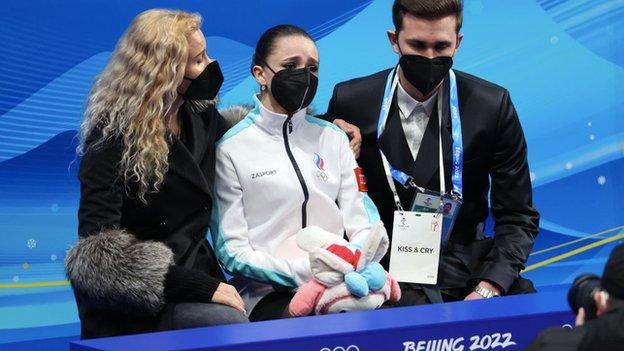Winter Olympics: Kamila Valieva treatment by entourage 'chilling' - IOC

| 24th Winter Olympic Games |
|---|
| Hosts: Beijing, China Dates: 4-20 February |
| Coverage: Watch live on BBC TV, BBC iPlayer, BBC Red Button and online; listen on BBC Radio 5 Live and BBC Sounds; live text and highlights on BBC Sport website and mobile app |
It was "chilling" to see the "cold" way distraught Kamila Valieva was treated by her Russian coach after several falls in her figure skating routine on Thursday, says International Olympic Committee president Thomas Bach.
Valieva, weighed down by a doping scandal and questions over the wisdom of allowing her to compete, made many mistakes in her free skate performance.
There was no hug and no comfort for the 15-year-old from coach Eteri Tutberidze when she came off the ice, instead she was asked "why did you stop fighting?".
Bach said the incident raised concerns for the future, adding: "When I afterwards saw how she was received by her closest entourage with what appeared to be a tremendous coldness, it was chilling to see this, rather than giving her comfort, rather than to try to help her."
Tutberidze, whose training methods were already under the spotlight, did put her arm around the young Russian while she waited for her score. But moments before that had demanded to know: "why did you let it go? Explain it to me, why?"
Bach said he was "very, very disturbed" by what he had seen when watching the competition on television.
"All of this does not give me much confidence in this closest entourage of Kamila, neither with regard to what happened in the past, nor as far as it concerns the future," he added.
"How to deal, how to address, how to treat a minor athlete at the age of 15 under such an obvious mental stress."
The event was won by Anna Shcherbakova, while fellow Russian Alexandra Trusova took silver. Both are 17 years old and also coached by Tutberidze.
Valieva's participation in the event had been controversial and had meant she had been under the media spotlight for 10 days in Beijing.
She was allowed to compete in the women's event after the Court of Arbitration for Sport (Cas) ruled against re-imposing a provisional suspension on her.
She discovered on 8 February - the day after helping the Russian Olympic Committee win the team event - that she had tested positive for angina drug trimetazidine but then successfully appealed against a Russian Anti-Doping Agency decision to impose a provisional suspension.
That decision was upheld by Cas after appeals by the IOC and others, with the court's ruling pointing to "exceptional circumstances" regarding her age and the timing of the test result, which came during the Games and nearly six weeks after the sample was taken.
The Cas ruling said it would do "irreparable harm" to not allow her to compete, but many were left questioning on Thursday whether it had in fact been worse to let her compete.
"I can only wish for her that she has the support of her family, the support of her friends and the support of people who help her over this extremely difficult situation," Bach added.
"And we can then only hope for her to see that this is addressed in the right way and there is not a dramatic experience for such a young woman."
The World Anti-Doping Agency (Wada) has said it will be investigating Valieva's entourage, including coaches, doctors and other adults surrounding her.



No comments